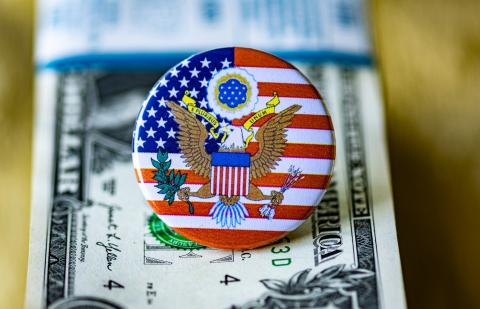Photo by Marek Studzinski on Unsplash
The 2024 elections broke another spending record from super PACs and other independent political groups. Yet, amidst billions being used to influence voter decisions, Maine citizens voted to rein in this spending on Election Day.
According to data released by OpenSecrets, independent political groups spent $4.5 billion in federal elections -- setting a new record for the most expensive election in US history. And this was just spending at the federal level.
This well surpassed the $2.95 billion spent during the 2020 election.
ALSO READ: OpenSecrets Reports More than $417 Million Raised for 2024 Ballot Measures
A significant chunk of the 2024 spending — nearly $2.1 billion — was directed toward the presidential race alone. This spending was particularly notable among super PACs and independent political groups.
The top spending independent group was the Harris-aligned Future Forward USA, which spent $517 million by itself. On the other side, the Trump-aligned Make America Great Again Inc. spent $364 million in support of the president-elect.
Super PACs are required to disclose donors. However, an additional $1 billion was funneled into the election by so-called "dark money" groups, organizations with a nonprofit tax status that exempts them from having to disclose their funders.
The influx of cash into the 2024 cycle has reignited debates about the role of money in politics, particularly with super PACs, which can raise and spend unlimited sums of money.
Maine Voters Say 'No' to Big Money with Question 1
While the national trend points to a sharp increase in the influence of super PACs and dark money groups, Maine citizens voted overwhelmingly to impose a $5,000 limit on donations to super PACs with Question 1.
"Question 1 got the most votes ever cast for anything or anyone in the history of the state of Maine. That's because getting big money out of politics is not partisan and it hasn't divided us like so many other things," said Cara Brown McCormick, chair of Citizens to End SuperPACs and Yes on 1.
"We are unified in asserting our right to have a system in Maine that is free from corruption and also free from any appearance of corruption."
LEARN MORE: Maine Question 1: Kyle Bailey Discusses Effort to Rein in Super PACs
Question 1 (at the time of this writing) has approximately 165,000 more votes than any other measure in the state's history. According to the latest vote tally, the measure passed with 74.4% in favor and 25.6% against.
The success of Question 1 marks a major victory for those advocating for stricter campaign finance laws, and it stands in stark contrast to the flood of outside money entering races across the country.
"Question 1 effectively ends super PACs in Maine and significantly diminishes the amount of big and dark money in Maine’s elections," said Yes on 1 Campaign Manager Kyle Bailey, who continues to build on a successful track record of reform in Maine.
Bailey and McCormick also led the efforts to implement and then protect ranked choice voting in state elections in 2016 and 2018. Bailey also served in the state House of Representatives.
The Bangor Daily News, which endorsed Question 1, says the measure sets the stage for a legal challenge to campaign contributions that will likely find its way to the Supreme Court in a post-Citizens United campaign finance environment.
"While it is a longshot that the U.S. Supreme Court will overturn rulings that have largely extinguished limits on campaign funding, we believe that the amount of money spent on political campaigns is outrageous and that limits need to be set," the paper writes.
RepresentUs, the nation's largest anti-corruption organization, celebrated Question 1's victory as well. The group's CEO, Joshua Graham Lynn, stated that "Maine voters just delivered a stunning rejection of the big money status quo."
Is The Money Being Wasted?
Lynn also pointed out that the overwhelming success of Question 1 shows that fighting big money in politics is popular across the political spectrum. "When our movement challenges big money directly, we win," he said.
The billions spent in elections, however, doesn't just raise concerns about the outsized influence a small group of big donors have in US elections -- but also the huge sums of money that are being wasted in the process to keep voters angry and divided.
Billions of dollars were raised for and against candidates in just the presidential contest. Vice President Kamala Harris significantly outraised and outspent Trump's campaign (which doesn't even get into independent groups). And yet, she lost.
Political scientist Lee Drutman writes that for all of the emails and texts voters get that emotionally manipulate and all but harass them to chip in $5, it more and more feels "like a marketing scam."
Especially when one looks at outside spending.
Most of the money doesn't go into building the campaigns. It goes toward advertising, which increasingly targets and amplifies voters' anxieties, fears, and anger. That was the 2024 election in a nutshell: "You have to hate the other side."
Drutman answers the question if any of this advertising actually makes a difference: "As one recent meta-analysis concluded, the average effect of campaign contact and advertising on election outcomes is zero."
He further argues that once money raised and spent reaches a certain threshold, it is pointless to inject more.
The billons US voters saw spent in the presidential election, whether by the campaigns or super PACs or "dark money" groups, did more to enrich campaign consultants, as well as broadcast and social media companies.
Meanwhile, Americans were constantly inundated with advertisements and marketing material designed to inflame divisions and raise people's anxieties over election outcomes should "the other side" win.
